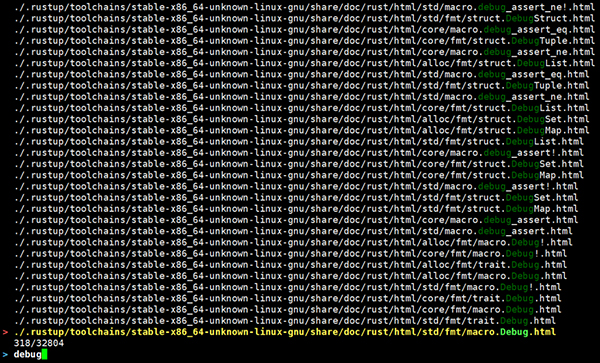

#Ripgrep github how to#
Learn Vimscript the Hard Way: is a book for users of the Vim editor who want to learn how to customize Vim.Derek Wyatt's Vim tutorial videos: video tutorials by Derek Wyatt's.

Vimcasts: screencasts by the author of practical vim.7 habits of effective text editing: a short guide on getting better at editing by the Vim author.usevim: a vim blog with some great outbound links.Patrick Schanen's Vim Page: an index of vim resources more complete than this list.vi.: questions and answers stackexchange style.: the most popular vim wiki, lots of great content.Vim Mac Mailing List: low volume mac specific list.Vim Dev Mailing List: high volume dev list.

#Ripgrep github manual#
#Ripgrep github code#
There’s some more (mostly technical) todos in the code I don’t know how to fix.All other Rust alternatives I could find don’t allow writing from multiple processes. Maybe use a different disk kv-store as a cache instead of rkv, because I had some weird problems with that.Allow per-adapter configuration options (probably via env (RGA_ADAPTERXYZ_CONF=json)).7z adapter (couldn’t find a nice to use Rust library with streaming).The cache is keyed by (adapter, filename, mtime), so if a file changes it’s content is extracted again. After completion, if the memory cache is smaller than 2MByte, it is written to a rkv cache. Most adapters read the files from a Read, so they work completely on streamed data (that can come from anywhere including within nested archives).ĭuring the extraction, rga-preproc will compress the data with ZSTD to a memory cache while simultaneously writing it uncompressed to stdout. To read archives, the zip and tar libraries are used, which work fully in a streaming fashion - this means that the RAM usage is low and no data is ever actually extracted to disk! Others use a Rust library or bindings to achieve the same effect (like sqlite or zip). Some rga adapters run external binaries to do the actual work (such as pandoc or ffmpeg), usually by writing to stdin and reading from stdout. You can see all adapters currently included in src/adapters. Rga-preproc will match an "adapter" to the given file based on either it’s filename or it’s mime type (if -rga-accurate is given). Rga simply runs ripgrep ( rg) with some options set, especially -pre=rga-preproc and -pre-glob. The code and a few more details are here: See the readme for more information.įor Arch Linux, I have packaged rga in the AUR: yay -S ripgrep-all Technical details Linux, Windows and OSX binaries are available in GitHub releases. Screenshots/-19-01-10.png crates.io I Browse All Crates Docs vĭocumentation Repository Dependent crates ~$ rga crates ~/screenshots -rga-adapters=+pdfpages,tesseract


 0 kommentar(er)
0 kommentar(er)
